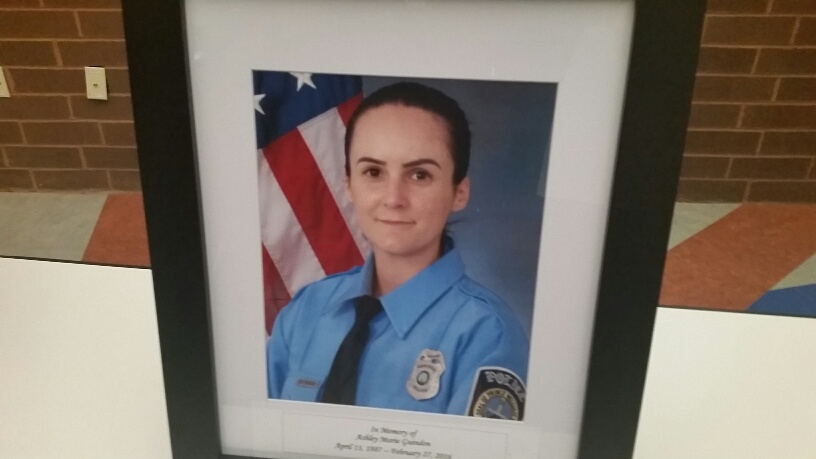The life of Ronald Hamilton — an Army staff sergeant convicted of capital murder for killing his wife and a rookie Prince William County, Virginia, police officer — was spared last year when the jury deadlocked in considering the death penalty.
The jury unanimously reached a life verdict on one capital charge for the premeditated murder of a law enforcement officer, but was unable to reach a unanimous decision on the aggravating factor of two premeditated murders in a three-year period. Since the jury was deadlocked, Judge Steven Smith imposed a life sentence.
Before he is officially sentenced Thursday, Hamilton has, for the first time, apologized to those he harmed and, in some cases, is asking for forgiveness.
“I failed to keep my vow as a husband and father and my oath to the country,” Hamilton said in a five paragraph letter included in the defendant’s memorandum in aid of sentencing. “I changed the lives of so many people, and I pray for each and every one of them every single day.”

Hamilton was convicted in the February 2016 shooting of his wife, Crystal Hamilton, and rookie police officer Ashley Guindon, who was on her first shift with the Prince William County Police Department.
After a heated argument, Hamilton shot his wife while their then-11-year-old son was in the home. When police entered the home, Hamilton used an AK-47, killing Guindon and wounding officers Dave McKeown and Jesse Hempen.
In the letter, Hamilton apologized to his country, his family, Guindon, McKeown, Hempen, his wife’s family and their now 13-year-old son.
“I was expected to conduct myself so as to bring credit upon the unit, the military service and my country, regardless of the situation in which I find myself in. But I failed to live up to that creed,” Hamilton said.
Hamilton addressed his family: “I took the life of your sister, daughter, best friend. You all have every right to be angry at me. I changed our family in ways that cannot be undone, but I hope with time I can gain your forgiveness.”
In words to Guindon’s mother, family and fellow officers, in addition to Crystal Hamilton’s mother and family: “I am sorry. I will never live down what I did, and if I could go back in time and change things, I would. Nothing that I say will bring back your daughters, but I am truly remorseful that I took their lives and caused you this pain.”
Hamilton apologized to McKeown, Hempen and their families: “I can’t take back the physical and emotional scars I have caused you.”
“Lastly, I want my son to know how sorry I am for taking his mother away from him and putting him in this terrible situation,” Hamilton wrote.
“I did not mean for this to happen, but it did, and there is no excuse of justification for my actions. I wish I could provide you a better explanation. This is all my fault,” Hamilton said.
On Oct. 25, 2018, a Prince William County jury of 10 women and two men sent a note to the judge, saying they were unable to reach a consensus on whether to sentence Hamilton to death or life in prison.
For a total of 16 counts, the jury recommended two life without parole sentences, five life sentences and a term of 93 years.
In the court filing, defense attorneys Edward Ungvarsky, Gene Hart and assistant capital defender Vivian Hernandez asked the judge to sentence Hamilton to concurrent life sentences, in which they are served simultaneously, rather than consecutive life sentences, which are served one after the other.
The imposition of a concurrent sentence “guarantees that Mr. Hamilton will spend the rest of his natural life within the walls of a penitentiary, but does not present as an unnecessary, excessive disposition without functional purpose and effect.”
In a Virginia sentencing hearing, the judge cannot impose a stricter penalty than the jury suggested. He can agree with the jury’s recommendation, impose a lesser sentence or suspend prison time as to all of the charges.
“Mr. Hamilton neither asks for suspended time nor lesser sentences,” according to his lawyers, in asking that the judge impose concurrent rather than consecutive sentences.
When contacted by WTOP, Prince William County Commonwealth’s Attorney Paul Ebert said he will argue for consecutive sentences.
“We’re going to ask for the maximum the court can give him,” Ebert said. “I don’t think he can get a big enough penalty.”
Ebert and fellow prosecutors remain convinced Hamilton should have been executed.
“As far as I’m concerned, he deserves the death penalty,” Ebert said. “This is the most egregious crime this jurisdiction has seen in a while.”
WTOP’s Neal Augenstein reported from Manassas, Virginia.
Editor’s note: This story has been updated to clarify the jury reached a unanimous life sentence in one of Hamilton’s two capital murder counts, but was deadlocked on the second capital murder charge.









